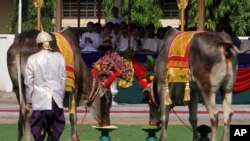The Royal Ploughing Ceremony, conducted in Takeo Province’s Daun Keo City on Wednesday, predicted a large increase in this year’s rice harvest after the sacred oxen choose to eat most of the bowls of rice, corn and beans offered to them, a Brahmin court priest declared.
Presided over by King Norodom Sihamoni and held to mark the beginning of the rice growing season, the annual ancient royal rite is conducted by Cambodia’s court Brahmins.
They lead the sacred oxen in three rounds of ceremonial ploughing after which the bovines are offered a choice of rice, corn, bean, sesame, grass, water, and rice wine.
Their decisions can be ominous or auspicious, and the amounts eaten also indicate what is in store for country in the year ahead.
A Brahmin priest announced that, “85 percent of rice were eaten, 90 percent of corns were eaten, and 85 percent of bean were eaten” by the oxen, which predicted a large increase in the harvest of these crops.
The national ceremony, which is televised live, was in the past often held next to the Royal Palace in Phnom Penh, but was this year staged in Takeo Province’s Daun Keo City on a football pitch prepared for the occasion.
Takeo Provincial Governor Ouch Phea and his wife, Srey Bunna Davy played a role in the ceremony, while National Assembly President Heng Samrin, Minister of Interior and Deputy Prime Minister Sar Kheng and other senior officials looked on.
Less predictable weather and harvests
Som Vitou, president of the Cambodian Center for Study and Development in Agriculture, told VOA he had no reason to think that this year’s prediction for the national rice harvest was likely.
In fact, he warned that climate change was making Cambodia’s monsoon rainfall and dry periods increasingly unpredictable and irregular, posing a risk for farmers, many of whom rely on rainfed paddy for their subsistence.
“We will also have difficulty to predict whether there will be flood or something else… there have been many changes [in the weather] lately,” he said.
He said the government should provide more information to farmers about these changes and how they can mitigate them, for example by digging large ponds to collect and store rainwater for periods of unexpected drought.







